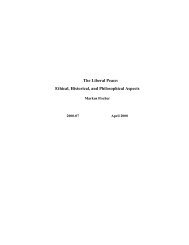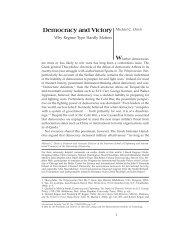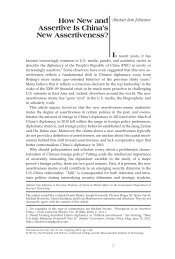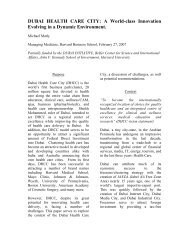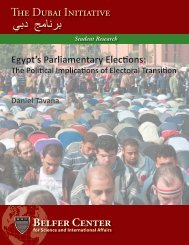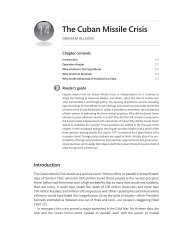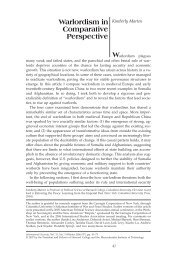The Promise and Problems of Pricing Carbon: - Belfer Center for ...
The Promise and Problems of Pricing Carbon: - Belfer Center for ...
The Promise and Problems of Pricing Carbon: - Belfer Center for ...
You also want an ePaper? Increase the reach of your titles
YUMPU automatically turns print PDFs into web optimized ePapers that Google loves.
THE PROMISE AND PROBLEMS OF PRICING CARBON BELFER CENTER 2011-12<br />
Critics <strong>of</strong> subsidy re<strong>for</strong>m claim it will harm low-income households, but most fossil fuel<br />
subsidies disproportionately benefit the relatively wealthy in developing countries. Indeed,<br />
about 40 percent <strong>of</strong> the benefits <strong>of</strong> petroleum subsidies accrue to the wealthiest quintile, while<br />
the lowest income quintile enjoys less than 10 percent <strong>of</strong> the subsidy benefits, on average<br />
globally (Coady et al., 2010). 7<br />
To promote implementation <strong>and</strong> cooperation on the G20 fossil fuel subsidies<br />
commitment, the leaders established two processes that enable a de facto “pledge <strong>and</strong> review”<br />
process. First, the leaders tasked their energy <strong>and</strong> finance ministers to compile a list <strong>of</strong> their own<br />
country’s fossil fuel subsidies <strong>and</strong> present their strategies <strong>for</strong> eliminating them. After a series <strong>of</strong><br />
staff- <strong>and</strong> ministerial-level consultations among the G20, the energy <strong>and</strong> finance ministers<br />
presented their plans in 2010 (G20 Leaders, 2010a). Second, the leaders tasked the Organization<br />
<strong>of</strong> Economic Cooperation <strong>and</strong> Development (OECD), International Energy Agency (IEA),<br />
World Bank, <strong>and</strong> the Organization <strong>of</strong> Petroleum Exporting Countries (OPEC) to evaluate fossil<br />
fuel subsidies (G20 Leaders, 2009). <strong>The</strong>se international organizations subsequently produced<br />
joint reports that serve as independent benchmarks <strong>of</strong> fossil pricing policies by which countries<br />
may evaluate others’ subsidy elimination plans (IEA et al., 2010).<br />
In 2010, the G20 leaders explicitly called on these international organizations to “further<br />
assess <strong>and</strong> review the progress made in implementing the Pittsburgh <strong>and</strong> Toronto commitments”<br />
(G20 Leaders, 2010b). While the G20 has no <strong>for</strong>mal compliance mechanism to explicitly<br />
en<strong>for</strong>ce the leaders’ commitment, it does establish a goal, an implementation process, <strong>and</strong> what<br />
can effectively be a third-party expert review. This combination provides transparency <strong>for</strong><br />
governments <strong>and</strong> stakeholders to assess whether nations are delivering on their leaders’<br />
commitments. This can promote credibility <strong>and</strong> trust <strong>for</strong> future international cooperation, <strong>and</strong><br />
may provide some lessons <strong>for</strong> the design <strong>of</strong> bottom-up international climate policy (see more on<br />
this below in our discussion <strong>of</strong> international coordination <strong>of</strong> carbon pricing policies).<br />
7<br />
<strong>The</strong> G20 agreement permits exclusion <strong>for</strong> subsidies that are explicitly targeted to low-income households. For<br />
example, the U.S. government has indicated that it considers the Low Income Home Energy Assistance Program to<br />
be exempt from subsidy elimination commitment <strong>for</strong> this reason.<br />
12




